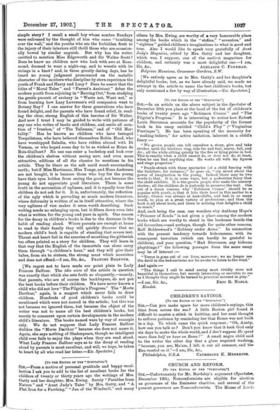fTo THE EDITOR Or THE " SPECTATOR."' Sra,—In an article
on the above subject in the Spectator of December 20th you place at the head of the list of children's
books of twenty years ago "Robinson Crusoe" and "The Pilgrim's Progress." It is interesting to notice bow Robert Louis Stevenson accounts for the popularity of the former book in his essay entitled "Child's Play" (" Virginibus Puerisque"). He has been speaking of the necessity for making-believe," for active imitation, inherent in a child's fancy :—
"We grown people can tell ourselves a story, give and take strokes until the bucklers ring, ride far and fast, marry, fall, and die ; all the while sitting quietly by the fire or lying prone in bed. This is exactly what a child cannot do, or does not do, at least, when he can find anything else. He works all with lay figures and stage properties."
"People struck with these spectacles [of a child fencing with the furniture, for instance]," he goes on, "cry aloud about the power of imagination in the young. Indeed there may be two words to that. It is, in some ways, but a pedestrian fancy that the child exhibits. It is the grown people who make the nursery stories ; all the children do is jealously to preserve the text. One out of a dozen reasons why Robinson Crusoe' should be BO popular with youth, is that it hits their level in this matter to a nicety; Crusoe was always at makeshifts, and had, in so many words, to play at a great variety of professions ; and then the book is all about tools, and there is nothing that delights a child so much."
And, such being the case, one wonders why Anthony Hope's "Prisoner of Zenda " is not given a place among the modern books which are worthy to stand in the bookcase beside the old favourites,—and perhaps, though for quite other reasons, Rolf Boldrewood's "Robbery under Arms." In connection with the present tendency towards hideousness, with its consequent terrorism (which can hardly be grateful to children), and your question, "Had Stevenson any hideous playthings P" the following passages from the same essay may be of interest :—
" Terror is gone out of our lives, moreover; we no longer see the devil in the bed-curtains nor lie awake to listen to the wind."
And again :— "The things I call to mind seeing most vividly were not beautiful in themselves, but merely interesting or enviable to me as I thought they might be turned to practical account in play."
Kendal.






































 Previous page
Previous page